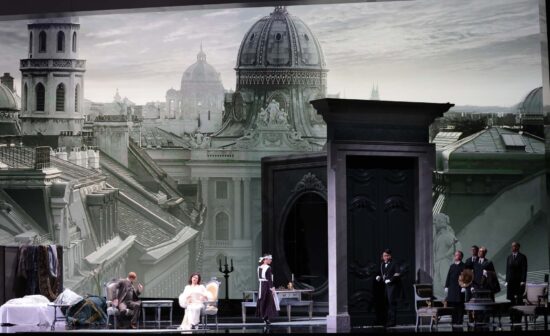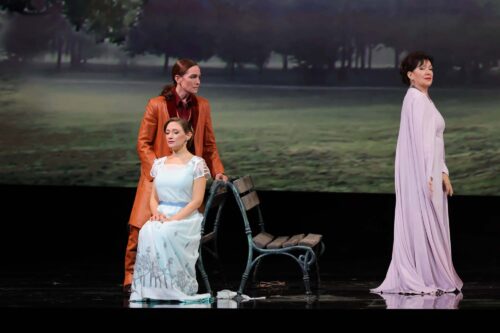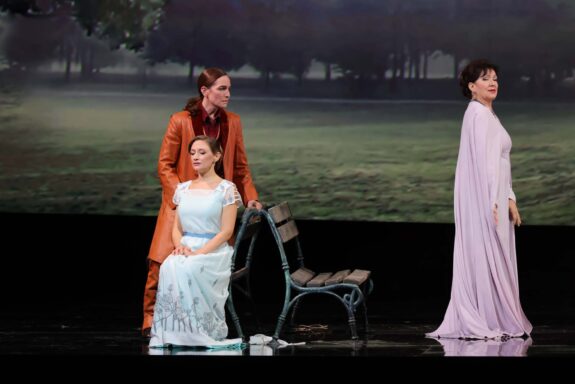 Italy Richard Strauss, Der Rosenkavalier: Soloists, Chorus and Treble Voices Chorus of the Teatro alla Scala Academy, Teatro alla Scala Orchestra / Kirill Petrenko (conductor). Teatro alla Scala, Milan, 19.10.2024. (CR)
Italy Richard Strauss, Der Rosenkavalier: Soloists, Chorus and Treble Voices Chorus of the Teatro alla Scala Academy, Teatro alla Scala Orchestra / Kirill Petrenko (conductor). Teatro alla Scala, Milan, 19.10.2024. (CR)

Harry Kupfer’s production of Der Rosenkavalier (first seen on the occasion of the composer’s 150th anniversary, ten years ago at the Salzburg Festival) is typical of his work in presenting the opera within a particular historical context, even if Richard Strauss and Hugo von Hofmannsthal’s original already richly evokes the eighteenth century. Kupfer transplants it to the time around its composition and premiere (1911) but it is not a simple, lavish recreation of that era. Rather it is conjured by (unpeopled) images in the projected backdrop of the grand buildings and cityscapes of Imperial Vienna; and the set itself is generally sparse, reminding us of the drama’s essential theatricality within a shallow, neutral white frame, subtly (but emphatically) putting the action in quotation marks as it were. The scenes of Vienna are mostly in black and white, as though a manifestation of the past, tinged by memory, rather than a present reality. The small amount of furniture for the Marschallin’s bedroom is still in the style of the ancien regime, though the furnishings of Faninal’s house are more up to date, with slim, linear designs, tellingly evoking the progression from languid aristocratic luxury (represented by the Marschallin, Octavian, and Ochs) to bourgeois, mercantile efficiency (embodied by the Faninal family).
Most colour is reserved for Act III with the shabby tavern where Ochs’s tryst with Mariandel is arranged, and which is set against a gaudy backdrop of illumined trees and fairground lights – surely to be taken as a more lurid counterpart to the last act of The Marriage of Figaro with its similarly arranged comic plot to foil a philandering cad in a garden. A sinister looking whale in rusty metal set over the tavern doors adds to the fantasy, as well as perhaps just a hint of the mechanised warfare that would shortly follow the opera’s premiere and sweep away the world of aristocratic privilege in Vienna that underpins the narrative. But certainly, there is nothing as crudely distracting as the huge cannon dropped into the set for Robert Carsen’s production at London’s Royal Opera House a few years back, for example.
Amidst all that is an attentive and sympathetic depiction of relations among the characters. Krassimira Stoyanova’s Marschallin is dignified and stoical, not indulging in self-pity but maybe even defiant in her Act I monologue when she reflects on time and ageing, always singing with crisp, assured expression. Kate Lindsey is a fairly ripe, mature-toned Octavian, by no means merely naive and playfully innocent, but notably strong willed. Sabine Devieilhe’s Sophie rightly sounds more tremulous and yielding, but she is equally sure what she wants, and from the start it isn’t Ochs. Together all three blend without friction in the climactic trio, if perhaps with some touching apprehension in it too, now that the moment of choice and confronting the future has arrived. In that respect, the Marschallin being driven off the stage in a car is poignant, and pregnant with meaning.

Günther Groissböck effects an admirably uncaricatured account of Ochs: the comedy and swagger are there, and a fluid delivery of the text and music, but he avoids crass buffoonery, so that it is possible to believe in his aristocratic status, even if he is rather full of himself. Any brashness is conveyed amply in the long-drawn vowels of some of his musical lines, which are enough to characterise his boorishness. The most garish vocal timbre is left for Piero Pretti as the Italian tenor in his Act I song at the Marschallin’s levée. By contrast, Michael Kraus is an appropriately austere Faninal.
Kirill Petrenko conducts an exemplary account of the score, full of colour and impetus from the sexually charged opening, but always remembering that, for the rest of the opera, it is support for the singers which is required rather than the orchestra being at the centre of attention itself. Strings are often lustrous (even if sometimes not quite unanimous) but not cloying, and orchestral textures remain lucid and flowing, especially in the long, eventful introduction to Act III, as also in that act’s trio. Like the production, the performance is one of thoughtful sophistication rather than brazen opulence.
Curtis Rogers
Cast:
The Marschallin – Krassimira Stoyanova
Baron Ochs – Günther Groissböck
Octavian – Kate Lindsey
Herr von Faninal – Michael Kraus
Sophie – Sabine Devieilhe
Marianne – Caroline Wenborne
Valzacchi – Gerhard Siegel
Annina – Tanja Ariane Baumgartner
A police inspector / A notary – Bastian-Thomas Kohl
The Marschallin’s Major-Domo – Haiyang Guo
Faninal’s Major-Domo / An innkeeper / A pet vendor – Jörg Schneider
An Italian singer – Piero Pretti
A milliner – Laura Lolita Perešivana
Four lackeys / Four waiters – Luigi Albani, Guillermo Esteban Bussolini, Andrzej Glowienka, Emidio Guidotti
A page – Giorgio Valerio
Production:
Director – Harry Kupfer
Revival director – Derek Gimpel
Set designer – Hans Schavernoch
Costumer designer – Yan Tax
Lighting – Jürgen Hoffmann
Video designer – Thomas Reimer
Chorus master – Alberto Malazzi
